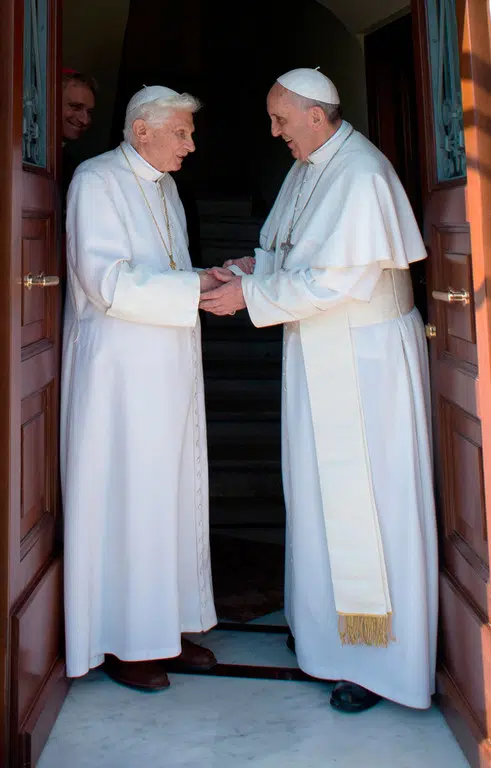Pope Francis and Pope Benedict XVI share a unique bond that transcends the conventional boundaries of papal succession. Their relationship is not merely one of predecessor and successor but rather a profound spiritual connection that has shaped the modern Catholic Church. As two distinct yet complementary figures, they have each left an indelible mark on the global religious landscape. Understanding their relationship offers insight into the complexities of leadership within the Vatican and the challenges faced by the Church in the 21st century.
The legacy of Pope Benedict XVI and Pope Francis is rich with lessons about faith, humility, and resilience. Pope Benedict's scholarly approach to theology and his commitment to traditional values laid a foundation upon which Pope Francis could build a more inclusive and compassionate vision for the Church. Together, they represent a harmonious blend of tradition and innovation, guiding the Church through turbulent times with wisdom and grace. This article explores their unique relationship, highlighting key moments and reflections that reveal the depth of their mutual respect and shared mission.
A Cardinal's Role in Shaping Papal Elections
During the 2005 conclave, Pope Francis revealed that he was involved in what he described as a maneuver aimed at preventing the election of Joseph Ratzinger, who would later become Pope Benedict XVI. Some cardinals reportedly sought to use him as a pawn in their scheme to block Ratzinger's ascent to the papacy. However, Pope Francis firmly resisted this effort, choosing instead to cast his vote in favor of Ratzinger.
This pivotal moment underscores the complexity of papal elections and the intricate dynamics among the College of Cardinals. Despite external pressures, Pope Francis demonstrated integrity by supporting the candidate he believed was best suited for the role. His decision reflects a commitment to the greater good of the Church, placing institutional needs above personal or political considerations.
In reflecting on this episode, Pope Francis highlights the importance of unity and transparency within the Vatican. By openly discussing his role in the conclave, he invites others to consider the ethical implications of such maneuvers and encourages future leaders to prioritize honesty and collaboration in their decision-making processes.
Building Bridges: A Legacy of Mutual Respect
Pope Francis has consistently praised his relationship with Pope Benedict XVI, dismissing any notion of tension between them as nonsense. In a forthcoming book-length interview, he emphasizes the strength of their bond, revealing how Benedict always defended him during challenging times. This mutual support serves as a testament to their shared dedication to the Church's mission.
Beyond personal rapport, both popes recognize the value of respecting differing perspectives within the Church. While they may approach issues differently, their common goal of strengthening Catholicism unites them. Pope Francis acknowledges that supposed divisions among their supporters are often exaggerated or misconstrued by external observers, urging Catholics to focus on unity rather than division.
This emphasis on harmony resonates deeply within the Church, reminding believers of the importance of fostering understanding and cooperation. By openly addressing these concerns, Pope Francis and Pope Benedict exemplify the virtues of humility and reconciliation, inspiring others to follow their lead.
Continuity Amid Change: The Evolution of Papal Leadership
Comparisons between Pope Francis and his predecessors, particularly Pope Benedict XVI, often highlight contrasting styles of leadership. Pope Benedict's scholarly focus on moral relativism contrasted with Pope Francis' emphasis on inclusivity and social justice. Yet, despite these differences, both men contribute significantly to the Church's ongoing evolution.
Pope Benedict's efforts to reawaken Christianity in a secularized Europe reflect his deep concern for maintaining the Church's moral clarity amidst societal changes. Meanwhile, Pope Francis advocates for a more outward-looking Church, emphasizing compassion and dialogue with diverse cultures. These approaches complement each other, offering a balanced perspective on how the Church can engage effectively with contemporary challenges.
Recognizing the nuances of their respective contributions helps avoid simplistic comparisons that undermine their individual legacies. Instead, appreciating their distinct strengths enriches our understanding of papal leadership and its impact on the global Catholic community.
Confidential Transfers: Ensuring Institutional Integrity
Before stepping down from his position, Pope Benedict XVI handed over a large white box containing confidential documents related to the Vatican's most pressing issues. This gesture symbolized his trust in Pope Francis to address unresolved matters affecting the Church. By transferring responsibility for these sensitive cases, Benedict ensured continuity in tackling difficult situations requiring urgent attention.
This act of transparency demonstrates Pope Benedict's commitment to leaving behind a clear path for his successor. It also underscores the importance of accountability within the Vatican, reinforcing the need for open communication and thorough documentation when transitioning leadership roles. Pope Francis accepted this weighty inheritance with resolve, acknowledging the gravity of the tasks ahead.
Through this exchange, both popes illustrate the significance of passing knowledge and experience across generations of leadership. Such practices strengthen institutional memory and promote effective governance, ensuring that critical issues receive proper consideration and resolution under new administrations.
Personal Reflections: Strengthening Bonds Through Dialogue
Pope Francis expressed a desire to personally narrate his interactions with Pope Benedict XVI since becoming pope. He wanted to ensure that their story remained authentic and untainted by secondhand accounts or misinterpretations. Archbishop Georg Gänswein, Benedict's longtime aide, had previously offered insights into their relationship, prompting Pope Francis to clarify certain aspects directly.
By sharing his firsthand experiences, Pope Francis fosters greater understanding of their dynamic partnership. His openness invites readers to appreciate the depth of their conversations and the mutual admiration underlying their exchanges. These dialogues serve as valuable examples of how respectful discourse can enhance relationships even amid differing viewpoints.
Ultimately, Pope Francis' willingness to engage in honest reflection reinforces the ideals of transparency and authenticity central to his papacy. Through these narratives, he inspires others to embrace vulnerability and seek meaningful connections rooted in truth and empathy, further solidifying the enduring legacy of his relationship with Pope Benedict XVI.

